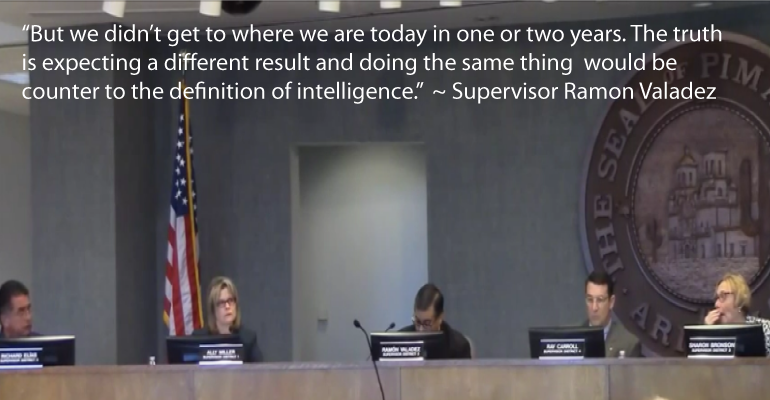
Pima County Supervisor Ally Miller called the 2015-17 Economic Development Plan a “plan for economic suicide” before casting the lone “no” vote on Tuesday.
After the vote Miller told constituents, “I did not approve Huckelberry’s 2015-17 Economic Development plan. The plan is heavily dependent on the $815 million – November 2015 Bond election passing, it advocates for a gas tax increase and lacks sustainable economic development for the 5th poorest region in the Country. “This is not a plan for economic development, this is a plan for economic suicide and I firmly believe that we’re going to put such a burden on the taxpayers of this community that we are not going to be able to move forward and I think we all know that taxes are a direct deterrent to economic development.”
One Pima County resident, who sat through the Tuesday morning meeting said, “There’s no money for all of these frills and that’s where the Bonds come in. How about we have some truth in voting. Stop calling new taxes bonds. Bonds equal taxes, but obviously citizens in Pima are not making the connection between the two. Maybe it’s too much sunshine or just voter laziness. Whichever it is, these new taxes will cost all citizens a pretty penny with the major load going on the backs of all businesses.”
Build it and they will come
Clearly the County administrator is aware of the crushing poverty and its effects on people. He writes, “As an economic development issue, poverty – the lack of resources to deal with problems – keeps people trapped in crisis and drains resources from our economic engine.”
Huckelberry acknowledges in his plan that “Economic development requires investment in our infrastructure,” yet he has little funding set aside in his proposed 2016 Bond package for the crumbling roads and bridges. Instead he proposes to build office space around the County in the hopes that business might fill it. At the same time, little attention is paid to reducing the highest taxes in the state, which has driven so many small business owners out of business and out of the County.
In the plan, Huckelberry admits that the employment situation is grim. He writes, “Pima County is the region’s largest downtown employer, and has been for more than two decades.” While he calls for the development of more County owned business space in rural areas, in the hope that it might someday be occupied, he notes that the County owns a building at 97 E. Congress that he hopes to sell or lease in late 2015, “to an employer who would bring primary employment based jobs to downtown Tucson.”
The definition of intelligence
Supervisor Ramon Valadez said that Pima County was not doing its part to bring opportunities to the community’s children. “The beginning of this economic development plan happened probably about 2008, 2009 when several of us, who were on the Board then, figured that doing the same thing we had been doing wasn’t getting us anywhere, and the one thing we had become really good at was exporting our children. Getting them through school, getting them through college, and then saying bye-bye.” Although that situation has only gotten worse, Valadez stated, “That isn’t the kind of community we wanted.”
He claimed that the “vision of this economic development plan is to change our community. Is it going to change it next year? No,” he stated. “Is it going to change it in two years? Probably not. But we didn’t get to where we are today in one or two years. The truth is expecting a different result and doing the same thing would be counter to the definition of intelligence.”
So in keeping with the definition of insanity, Ramon Valadez cast his vote to raise property taxes once again. Part of the plan he supports also relies on an increase of the highly regressive gas tax that will further cripple those in the community who can least afford it.
Over the years, under Valadez and the Board majority, the County achieved the distiction of being the home to the fifth poorest metropolitan area in the country. At the same time, taxes have increased while property values for taxing purposes have held steady or increased. This has resulted in one of the highest foreclosure rates in the country.
Motion to approve the 2015-17 Economic Development plan
Supervisor Richard Elias moved to have the Board vote on the Economic Plan. Supervisor Ray Carroll seconded the Motion speaking almost incoherently, “I second the Motion, and I want to support those that come from the business community, and the other areas of our economic development team, that believe that not only in this plan, but future bonding is directly important to the future lifeblood of our community. So I support it proudly and I’m glad to be here.”
